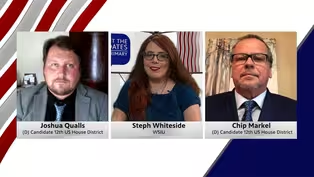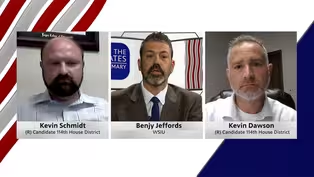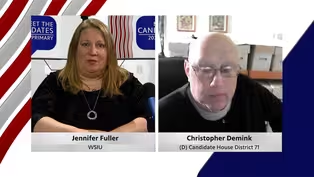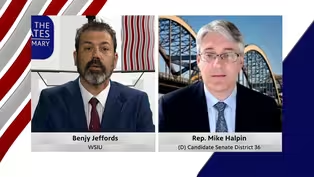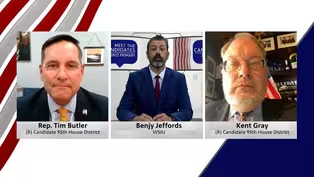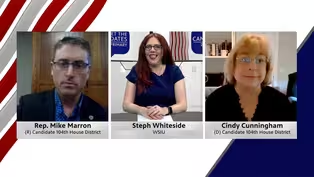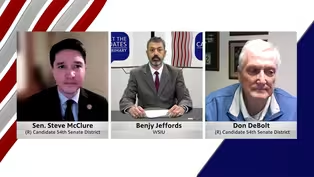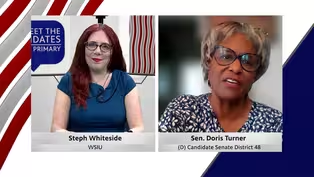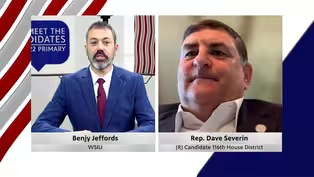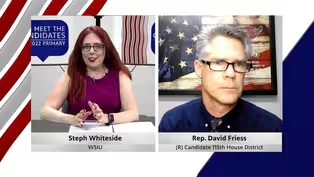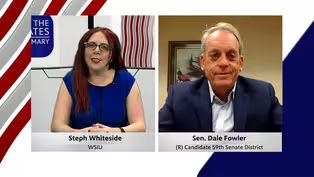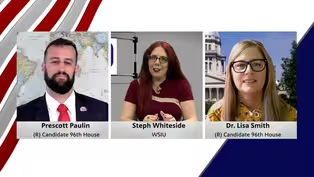Meet the Candidates
100th Illinois House District Primary Republican Candidates
4/28/2022 | 26m 9sVideo has Closed Captions
WSIU interviews candidate C.D. Davidsmeyer, running for the 100th House seat.
On this episode of Meet the Candidates, WSIU interviews candidate C.D. Davidsmeyer, running for the 100th House seat.
Problems playing video? | Closed Captioning Feedback
Problems playing video? | Closed Captioning Feedback
Meet the Candidates is a local public television program presented by WSIU
This series is produced in partnership with the League of Women Voters
Meet the Candidates
100th Illinois House District Primary Republican Candidates
4/28/2022 | 26m 9sVideo has Closed Captions
On this episode of Meet the Candidates, WSIU interviews candidate C.D. Davidsmeyer, running for the 100th House seat.
Problems playing video? | Closed Captioning Feedback
How to Watch Meet the Candidates
Meet the Candidates is available to stream on pbs.org and the free PBS App, available on iPhone, Apple TV, Android TV, Android smartphones, Amazon Fire TV, Amazon Fire Tablet, Roku, Samsung Smart TV, and Vizio.
Providing Support for PBS.org
Learn Moreabout PBS online sponsorshipMore from This Collection
Meet the Candidates features interviews with candidates running for Illinois state, House and Senate races. Guests will discuss key issues impacting Illinois voters such as the economy, the environment, education and public health. This series is produced in partnership with the League of Women Voters.
12th U.S. Congressional Seat Primary Candidate Forum
Video has Closed Captions
Joshua Qualls and Chip Markel, running for the 12th U.S. Congressional Seat. (25m 21s)
114th Illinois House District Primary Candidate Forum
Video has Closed Captions
Dr. Kevin Schmidt and Kevin Dawson, running for the 114th House District. (25m 57s)
71st House District Primary Candidate
Video has Closed Captions
Ahead of the June primary, WSIU talked with Christopher Demink, running for the 71st House (21m 35s)
36th Senate District Primary Candidate Forum
Video has Closed Captions
WSIU talked with 36th Senate District candidate Representative Mike Halpin. (26m 29s)
95th Illinois House District Primary Republican Candidates
Video has Closed Captions
Representative Tim Butler and Kent Gray, running for the 95th House District. (26m 58s)
104th Illinois House District Primary Candidates
Video has Closed Captions
104th House District candidates Representative (R) Mike Marron and (D) Cindy Cunningham. (26m 49s)
54th Illinois Senate District Primary Republican Candidates
Video has Closed Captions
54th Illinois Senate District Primary Republican Candidates forum. (25m)
48th Illinois Senate District Primary Democrat Candidates
Video has Closed Captions
48th Illinois Senate District Primary Democrat Candidates forum. (26m 46s)
116th Illinois House District Primary Republican Candidates
Video has Closed Captions
116th Illinois House District Primary Republican Candidates forum. (25m 9s)
115th Illinois House District Primary Republican Candidates
Video has Closed Captions
115th Illinois House District Primary Republican Candidates forum. (23m 14s)
59th Illinois Senate District Primary Republican Candidate
Video has Closed Captions
WSIU interviews Senator Dale Fowler from the 59th Senate District. (27m 29s)
96th Illinois House District Primary Republican Candidates
Video has Closed Captions
Candidates Prescott Paulin and Dr. Lisa Smith, running for the 96th House seat. (28m 45s)
Providing Support for PBS.org
Learn Moreabout PBS online sponsorship(upbeat music) - This is "Meet the Candidates" and we are here with Candidate CD David Meyer running for the 100th House District.
I'm Benjy Jeffords, WSIU Public Broadcasting and the League of Women's Voters are pleased to host today's forum.
Thank you so much for joining us today CD, let's get started.
What is your number one priority if elected?
I know it can be hard to narrow it down, but please try to stick to just one.
- I would say fiscal responsibility, obviously the State of Illinois is known for high taxes and the people of Illinois have to know that they're getting a return on that investment.
So I believe that our number one priority should be paying off long term debts such as pension liability and things of that sort to get us back on on a level playing field with our surrounding neighbors.
- Excellent, and what would make you an effective lawmaker if elected?
- Well, I'm very willing to work across the aisle.
I've served in the super minority and the regular minority for about nine years.
And the reality is you can't accomplish thing from the minority, unless you can get the other side to work with you.
And I've been able to pass a number of bills through the years.
Also, I'm not afraid to speak my mind and I can do it in a very diplomatic way to make sure that people understand my point of view without being a divisive individual.
- The pandemic really exposed disparities in education funding, what would you do to make sure schools in your district are able to meet the needs of families and students?
- Well, first off, I would say we have to stop passing unfunded mandates at the state level.
A lot of times the politicians in Springfield wanna pass bills and send out a press release and say, "Hey, look what I did for you" when they don't actually fund the things that we're talking about.
Right now, the state is at a upward progression on school funding, we're adding an additional 300 to 350 million every for 10 years starting about, I wanna say four years ago, we started.
So we're trying to get back on a better payment cycle to ensure that our schools are better funded which when the state picks up more of the school funding burden, we can hopefully take some of the burden off of local property taxpayers.
- And the next question is, the state budget is major priority in Springfield.
Name three things you would prioritize?
- So in the state budget I would say, we've gotta prioritize education as one, because I truly believe that education is the one great equalizer.
The one great thing that can put everybody on a level playing field.
I know not everybody has the same support system at home, but when they go to school, they should have the same exact support system when they go to school.
So we've got a lot of great teachers out there that do a lot of good work and I think that we have to do everything we can to support them and encourage people to go into that field.
When we talk about the budget in particular, a large part of the budget is human services.
Every year I request to serve on the Human Services Appropriations Committee, because it is such a large portion of the budget.
The issues we deal with are not always easy.
You're dealing with making sure the developmentally disabled have the services that they need, making sure seniors have the services that they need and those who truly cannot take care of themselves, making sure that they have everything they need and certainly prioritizing the individuals that cannot take care of themselves.
We wanna make sure to provide that opportunity and maybe a leg up for those who are working towards being able to truly take care of themselves.
And then I would say third, one of the biggest things I hear about is with regards to the budget is infrastructure.
The number of roads that we have and bridges with pot potholes or certainly bridges that are 80 plus years old that had a life expectancy of maybe 70.
We certainly are putting efforts towards ensuring that our roadways are good and safe for the traveling public.
- Okay, now that we've talked about the budget priorities, what are three things you would cut?
- So, one thing that I would cut, over the past, I would say five years, there've been a push to expand free healthcare for undocumented or illegal immigrants.
I don't think that the State of Illinois should be fully funding that program because we're not doing it for the citizens that are actually here legally.
So that's something that I would look at.
I'm trying to think there's a new program that just passed in this year's budget.
$600 guaranteed income pilot program for East St. Louis, I think it's an election-year ploy.
I think we shouldn't be just handing out money to people who can and should be taking care of themselves.
And then let's see, that's the third one.
It's a good question.
Right now, I'm not sure, I'd have to look back through the budget.
- Okay, and although the economy is recovering from the early stages of the pandemic, inflation is also on the rise, what would you do to help Illinoisans who are finding their paychecks don't stretch as far as they did even a couple of months ago?
- It's pretty hard to have a great impact at the state level, a number of things that they did in this past budget that passed about a week and a half ago, were things like suspending the grocery tax until July 1st of next year, the average person will save maybe 15 to $25, suspending the gas tax increase until July 1st or January 1st, which should save maybe $10 for the average person.
I think we need to look at things that will truly affect the individual, not in small tiny dollars, not in short term things, but true tax reform, true tax cuts.
So the short term things that allow a politician to say, "Hey, I cut your taxes" when the average person will not receive very much of an impact, I think we need to truly look at real tax reform, decreasing taxes.
- Many people are pushing for more renewable energy, especially with the rising price of oil.
At the same time, parts of Illinois have fossil fuel supplies that could provide energy for many years to come.
What would you do to ensure Illinois has a steady supply of energy and keep it affordable for Illinoisans?
- Yeah, I'm a true believer on all of the above approach to energy policy.
There are things right now and I understand that the environmental side doesn't wanna invest in coal plants, but there are things that we could do today to coal plants to decrease the emissions.
The reality is downstate in my district, people need coal to be able to flip on the light switch.
People need coal to have heat in the winter and air conditioning in the summer.
So we have to look at all of the above approach.
We have to make sure that we're not trading one bad thing for another.
When we look at pushing towards all electric vehicles, my concern is that in the short term, we have a positive impact, but in the long term, we're just shoving more into our landfills.
So, I think we have to really take a realistic approach and not do the things that feel good today that are gonna hurt tomorrow, but actually look at the overall impact on the future of our state and our nation.
- COVID 19 really changed the way people look at healthcare and public health.
What would you do to make sure Illinois is prepared to handle future public health emergencies?
- The first thing I would do is say that the General Assembly is elected to be part of governing.
We're not elected to sit on the sidelines, and I think during this pandemic, you saw the General Assembly sit on the sidelines, happy to let the Governor run the show and take all the positives or negatives that may come.
The reality is that we are a partner in governing the state.
And we should have been there all long.
I certainly would clarify the law to say that the Governor has 30 days period in the instance of an emergency until the General Assembly can come and convene and help make part of the decision.
So I would certainly clarify the legislation to ensure that no Governor ever has the kind of power that this Governor claimed to have all along.
- Gun violence continues to be a problem for communities across the state.
What would you do to address the violence and how do you balance that with Second Amendment rights?
- So I always say there's nobody that wants to get rid of a criminal with a gun more than a legal gun owner.
I'm a legal gun owner, I practice the second amendment, I grew up hunting, but I also enjoy the shooting sports.
I think that we have to look at it and say, how do we ensure that criminals are not getting access to firearms?
Illinois is not a bubble, so when we look at constricting the laws on Illinois citizens, we can't act like people in Chicago can't run across the border to Gary Indiana and buy illegal guns.
So we truly have a national approach to going after gun crime.
And I think that we have to prosecute gun crime.
Right now, the City of Chicago, the state's attorney up there, Kim Fox is not doing her job.
She is not going after gun crime.
And if we truly wanna get rid of gun crime, we have to attack gun crime.
- And criminal justice reform is a hot topic in Springfield.
Do you support changes to the system, including alternative sentencing like drug courts, and what changes would you make to ensure safety while also making sure rehabilitation remains an option?
- I'm very realistic, I would say when I originally came into office, I was a lot more tough on crime and everything is a black or white issue.
But I think there's a lot of gray area.
Over the years I've supported a lot of reforms that have allowed people who are coming out of prison to get certain licenses.
For some reason, for instance, the State of Illinois wouldn't allow a felon to get a barber's license.
It makes no sense for them not to be able to get out, have a job and cut hair.
So, we have to focus on, I think focusing on family and community first to deter individuals from committing crimes.
But after the fact, we also have to focus on reform.
I think that providing programs for individuals, knowing that they're going to get out of prison, we have to make sure that they have every opportunity to become a roof or a barber or whatever it may be so that they're not getting caught in the revolving door of the criminal justice system.
We wanna make sure that if they make a mistake, that they're able to truly get past that mistake, learn from it and never come back again.
So I'm a big proponent of providing opportunities for individuals who have made those mistakes or committed a crime.
- Recent events have shown how much Americans can be impacted by global politics as evidenced by supply chain shortages and rising prices due to the pandemic and fighting in Ukraine.
What would you do to try to help minimize a disruption of events like these on the people of Illinois?
- Yeah, I think, it comes back to having domestic production, whether you're talking about oil or microchips or whatever you're talking about, I think that we truly have to have an America first type of agenda, it'll bring jobs back to Illinois, to the United States, certainly provide more opportunities for the people that are living right here.
We have to be willing to pay a little bit more for products, but if we know that it's made here and that it's reliable, we will certainly be better off.
- And what would you do to make sure that the concerns of your constituents are heard in Springfield, considering the population density skews toward the northern part of the state?
- Over the years, I've done my best to try to create relationships with individuals in the city.
A big part of what I've looked at and there's a lot of people that talk about creating a 51st state, whether it's Downstate Illinois or Chicago being that 51st state.
I've joined in on that conversation, but to bring a perspective that the City of Chicago is a huge major economy that competes with cities like LA and New York, Beijing, internationally, they're competing.
When you look at my district, it's a large world district, and we're looking at competing with Missouri and Indiana and a lot of our neighboring states.
So when we look at policy, we have to make sure that we look at policies that truly allow all areas of the state to really compete.
It can't be a one size fits all, it has to be something that allow Chicago to truly compete internationally and allows downstate rural communities to compete with our neighbors.
- [Benjy] What would you do to help ensure fair elections and access to all voting for people in Illinois?
- Yeah, I think we've created so many opportunities.
I wanna make sure that those who can vote and wanna vote, do vote, but we have to make sure that it's done without intervention from somebody who's politically motivated, whether it be award boss in Chicago or somebody who's trying to steal balance.
I think that those who can, should show up and vote, and I truly believe in a voter ID, the reality and the discussions that a lot of people have about voter ID is that it's discriminatory, I completely disagree.
I think that in this world, you have to have an ID to apply for benefits through the State of Illinois, you have to have an ID for so many different things that an individual should have an ID to be able to go vote.
And if not, we should provide the opportunity every election year for an individual to go get a free ID at the Secretary of State's office.
There's nothing that deter individuals from voter fraud more than having to actually show up in person with an ID that shows their face.
So I think that's one step in the right direction, ensuring that our election integrity, we have to look at our voting boxes to ensure that they can't be tampered with.
So, we have to continue to keep up with technology and ensure that nobody can hack into our systems.
- [Benjy] And speaking of technology, internet access is becoming increasingly necessary for people to work and go to school.
What would you do to make sure rural areas can access the high speed internet they need?
- The State of Illinois has a program set up to increase access to the internet for rural areas.
I think their definition of rural areas is pretty broad.
So a lot of times you're looking at communities that are not far outside of the collar counties.
When I talk about rural communities, I'm talking about communities that are towns of 300 and out in the middle of a cornfield, like I represent.
We have to ensure that companies that are taking these bids that are going out to provide internet are not just laying lines over top of another internet provider's lines.
That's what happened back in the, I'd say probably 2012, 2013, there were a lot of companies coming in and just creating more competition as opposed to providing service to those individuals who do not have service.
So we have to prioritize those areas.
Certainly $400 million that we put towards expanding internet into rural areas was a first step, it's not the end of it, but we have to make sure that we're providing opportunities for everybody.
And that would be an infrastructure investment for the people of the State of Illinois.
So that's something that I'm willing to willing to look at funding.
- [Benjy] And COVID-19 has depleted the state's unemployment fund.
What would you do to address this?
- That's a big issue.
So the unemployment, certainly the State of Illinois, the Governor shut down many businesses during COVID and through no fault of their own, businesses were shut down and individuals working there were not able to go to work.
So the federal government and the State of Illinois expanded unemployment insurance offerings.
Currently, the State of Illinois owes the federal government four and a half billion dollars for unemployment insurance.
The Democrats passed a bill by themselves to fund 2.7 billion of that.
When Republicans were pushing them to fund a 100% of it, $4.5 billion, we had over six and a half billion dollars left of federal ARPA funds, which were the federal COVID funds that were meant for COVID reasons.
And that's precisely, like COVID caused the unemployment problem.
Those COVID dollars should have been spent to pay that down.
They still can be, the Governor can choose not to fund $2.6 billion of port projects in Democrat-only districts, that the Governor can choose not to fund those things and can choose to put that money back into the unemployment system where it was meant to go.
I certainly encourage him to do so, if not, if we don't fund that, it's a guaranteed tax increase on every job in the State of Illinois and a guaranteed benefit decrease for workers who fallen hard times, for workers who are laid off or lose their job, we have to ensure that we actually fund the backlog in the Unemployment Trust Fund at the federal level.
- And Illinois has some of the highest property taxes in the country.
What would you do to provide relief to homeowners?
- I would say one of the biggest things that State of Illinois can do is to actually fund education.
I think we should be funding greater than 50% of our districts, greater than 50% of the needed funding.
And that would mean we have to make education a priority at the state level, which means that we'll have to look at cutting funding of other programs, whether they're pet projects or whatever they may be.
We have to have that discussion to say, "Okay, education has to come first."
We have to truly do something that will lead to a decrease in property taxes.
We have have a lot of people in Springfield that talk about wanting to cut property taxes, but they also pass the unfunded mandates that require local governments to find the funding.
The only place that the school district for instance, can find funding is property taxes.
So we really have to look at funding these things better from the state level.
- [Benjy] And social services are another area that has seen funding depleted during the pandemic.
What would you do to make sure all Illinoisans can get the help they need?
- We have to ensure that we are truly helping those that are in need first.
I think that there are individuals out there that take advantage of the system.
I'm not saying that they are a majority, but we have to weed out those individuals first.
There are a number of service, whether it's DCFS, who is completely failing the State of Illinois right now, or your Department of Aging, who's actually doing a very, very good job, did a great job during the pandemic.
We have to look at these departments and say, "Okay, what led to the success at the Department of Aging and how can that cross over to help kids get away from child abuse or families that aren't taking care of their kids."
We need to make sure that we look at our victories and use those across the board throughout our departments.
- Well, it looks like we're out of time.
So thank you so much for joining us for "Meet the Candidates" for House District 100 with CD Davidsmeyer.
- Thank you very much.
- Thank you.
Tune in next Thursday at 7:00 PM for were more candidates for House Districts 115 and 116.
For WSIU, I'm Benjy Jeffords.
(soft music)

- News and Public Affairs

Top journalists deliver compelling original analysis of the hour's headlines.

- News and Public Affairs

FRONTLINE is investigative journalism that questions, explains and changes our world.












Support for PBS provided by:
Meet the Candidates is a local public television program presented by WSIU
This series is produced in partnership with the League of Women Voters

